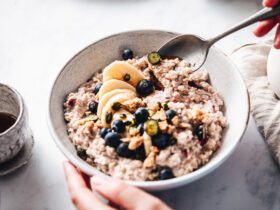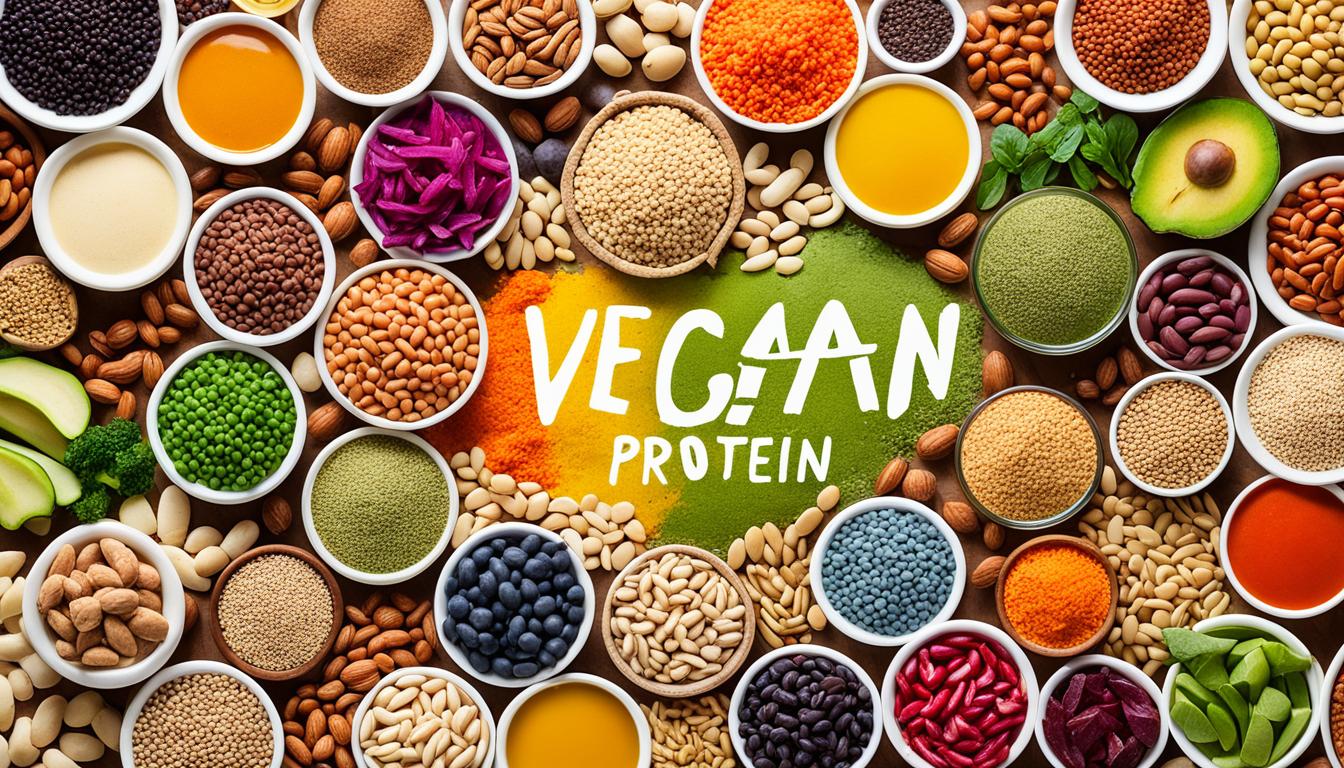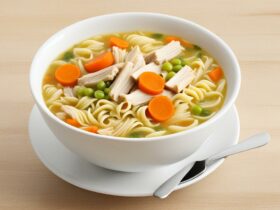A well-planned vegan diet can provide all the nutrients you need, including protein. However, certain plant foods contain more protein than others. Higher protein diets can promote muscle strength, feelings of fullness, and weight loss. Poorly planned or highly processed vegan diets may increase the risk of nutrient deficiencies. It is important to include a variety of protein-rich vegan foods in your diet to meet your nutritional needs.
Key Takeaways:
- Include a variety of protein-rich vegan foods in your diet to meet your nutritional needs.
- Higher protein diets can promote muscle strength, feelings of fullness, and weight loss.
- Poorly planned or highly processed vegan diets may increase the risk of nutrient deficiencies.
- Seitan, tofu, legumes, quinoa, oats, nuts, and vegetables are excellent vegan protein sources.
- Plan your meals to ensure you are getting enough protein and consider any nutrient gaps that may need to be addressed through supplements or fortified foods.
Vegan Protein Sources: Seitan, Tofu, and Legumes
When it comes to finding plant-based protein sources, vegans have plenty of options to choose from. Incorporating a variety of protein-rich vegan foods into your diet is essential to ensure you are meeting your nutritional needs. From seitan and tofu to legumes, let’s explore some of the top vegan protein sources.
“A well-planned vegan diet can provide all the nutrients you need, including protein.”
Seitan
Seitan is a popular choice among vegans looking to increase their protein intake. Made from wheat gluten, seitan is incredibly versatile and can be used in a variety of dishes. It offers approximately 25g of protein per 100g serving, making it an excellent option for those seeking a high-protein plant-based alternative.
Tofu, Tempeh, and Edamame
Tofu, tempeh, and edamame are all derived from soybeans and are rich sources of protein. Tofu provides around 12-20g of protein per 100g serving, depending on its firmness. Tempeh offers a similar protein content to tofu, with approximately 15g per 100g serving. Edamame, or young soybeans, provides around 13g of protein per 100g serving and can be enjoyed as a snack or incorporated into various dishes.
Lentils and Beans
Lentils and beans, including kidney, black, and pinto beans, are staples in a vegan diet and are packed with protein. A cooked cup of lentils contains about 18g of protein, while the protein content in cooked beans ranges from 15-18g per cup. These plant-based protein powerhouses are not only nutritious but also offer a good amount of fiber, making them a great addition to any vegan meal plan.
Nutritional Yeast
Nutritional yeast is a popular ingredient among vegans due to its cheesy flavor and nutritional profile. It is a complete source of plant protein, providing around 8g per 2 tablespoons. Nutritional yeast is often used as a topping for popcorn, pasta, or salads, adding a boost of protein and a savory taste.
Spelt, Teff, and Hemp Seeds
Spelt and teff are ancient grains that offer an impressive amount of protein. With approximately 10g of protein per cooked cup, spelt is a great addition to salads, soups, or as a side dish. Teff, a gluten-free grain, offers similar protein content to spelt and can be used in porridges, stews, or baked goods. Hemp seeds are another excellent protein-rich option, containing approximately 10g of protein per 2 tablespoons. They can be sprinkled over salads, added to smoothies, or used in homemade energy bars.
By incorporating these plant-based protein sources into your diet, you can ensure that you are getting the necessary nutrients while following a vegan lifestyle.
Up next, we’ll explore other vegan protein powerhouses such as quinoa, oats, and nuts.
Veggie Protein Powerhouses: Quinoa, Oats, and Nuts
When it comes to high protein vegan foods, there are several nutritious options that can power up your plant-based diet. Quinoa, oats, and nuts are three protein-rich choices that not only provide your body with essential amino acids but also contribute to a well-rounded and satisfying meal plan.
Quinoa: The Complete Protein Source
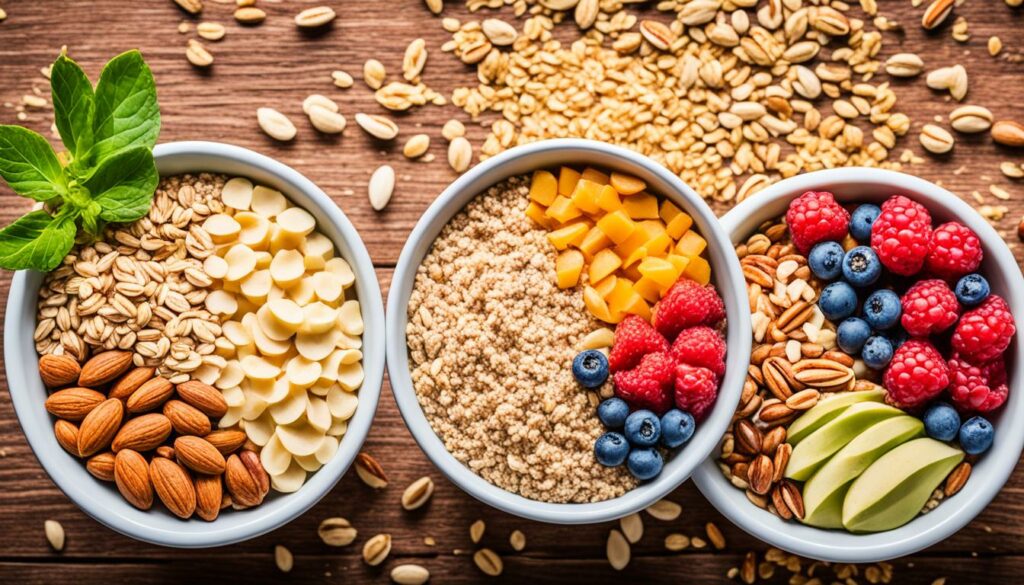
Quinoa, often referred to as a superfood, is a fantastic source of plant-based protein. It contains all nine essential amino acids, making it a complete protein source. With approximately 4g of protein per 100g, quinoa offers a substantial protein boost to any vegan dish you create. Whether you use it as a base for salads, a substitute for rice, or in hearty grain bowls, quinoa is a versatile and nutritious addition to your protein-packed meals.
Oats: Versatile Protein Powerhouse
Oats are not only a popular breakfast staple but also a valuable source of plant-based protein. With approximately 10g of protein per cup, oats supply a significant amount of amino acids to support your active lifestyle. Whether you enjoy them in warm oatmeal bowls, homemade granola, or protein-rich energy bars, oats provide a hearty and delicious way to meet your protein needs.
Nuts: Nature’s Protein-Rich Snacks
Nuts, including almonds and peanuts, are nature’s protein-rich powerhouses. With around 20-25g of protein per 100g, these tasty treats offer a substantial amount of plant-based protein in a convenient and portable form. Whether you enjoy them as a snack, incorporate them into your favorite recipes, or use them as a topping for salads and smoothies, nuts provide a satisfying crunch and a protein boost to your vegan diet.
Additionally, chia seeds and hemp seeds are excellent choices for adding more protein to your plant-based meals. With 18-31g of protein per 100g, these tiny seeds pack a powerful punch in terms of nutrition. Add them to smoothies, sprinkle them on top of yogurt or oatmeal, or use them in baking to enhance the protein content of your favorite vegan treats.
By incorporating these veggie protein powerhouses into your diet, you can ensure that you’re getting an ample amount of protein to support your health and fitness goals as a vegan.
Getting Protein from Vegetables and Greens
While legumes and grains are often touted as the go-to sources of plant-based protein, vegetables and greens also have their fair share of protein content. Incorporating these nutrient-rich foods into your vegan diet can further boost your protein intake. Let’s take a closer look at some high protein options:
Broccoli and Mushrooms
Broccoli and mushrooms may not be the first foods that come to mind when you think of protein, but they can still make a valuable contribution to your daily intake. Broccoli contains approximately 3-5g of protein per 100g, while mushrooms provide about the same amount. These versatile vegetables are not only packed with protein but also offer other essential nutrients and antioxidants to support overall health.
Green Peas and Asparagus
Green peas and asparagus are fantastic plant-based protein sources to incorporate into your meals. Green peas provide around 9g of protein per cooked cup, making them an excellent addition to salads, stir-fries, or even as a standalone side dish. Asparagus, on the other hand, offers approximately 2g of protein per cooked cup. Both vegetables are low in calories and high in fiber, making them a nutritious choice for any vegan diet.
Other Protein-Rich Vegetables
Aside from broccoli, mushrooms, green peas, and asparagus, there are other vegetables that you can rely on to boost your protein intake. Spinach, for example, contains about 2g of protein per cooked cup and is also rich in iron and vitamins. Brussels sprouts offer approximately 3g of protein per cooked cup, along with a host of other beneficial nutrients. Cauliflower, known for its versatility, contains around 2g of protein per cooked cup and is a great addition to stir-fries, curries, or even as a pizza crust alternative.
Incorporating these protein-rich vegetables and greens into your meals provides a variety of flavors, textures, and nutrients to support a balanced vegan diet.
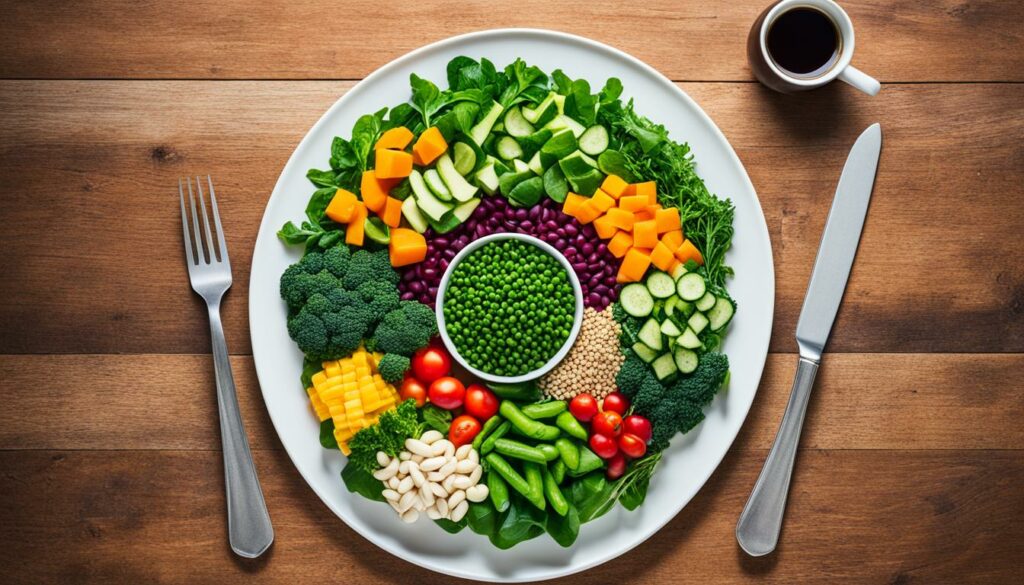
| Vegetable | Protein Content per 100g |
|---|---|
| Broccoli | 3-5g |
| Mushrooms | 3-5g |
| Green Peas | 9g per cooked cup |
| Asparagus | 2g per cooked cup |
| Spinach | 2g per cooked cup |
| Brussels Sprouts | 3g per cooked cup |
| Cauliflower | 2g per cooked cup |
Conclusion
Meeting your protein needs on a vegan diet is both feasible and enjoyable, thanks to the abundance of plant-based protein sources available. From seitan, tofu, and legumes to grains, nuts, and vegetables, there are a plethora of high protein vegan foods to choose from. By incorporating a diverse range of these options into your meals, you can easily meet your daily protein requirements.
Protein-rich vegan sources like seitan and tofu offer substantial amounts of protein, providing you with the necessary fuel for muscle strength and fullness. Legumes, such as lentils and beans, are also excellent choices, contributing to a well-rounded and nutritious vegan diet. Additionally, grains like quinoa and oats, along with nuts like almonds and peanuts, are not only rich in protein but also offer essential vitamins and minerals.
Even vegetables play a crucial role in boosting your protein intake. Greens like broccoli, spinach, and asparagus provide valuable protein content and are great additions to any vegan meal plan. By incorporating a variety of plant-based protein sources, you can ensure a properly balanced diet that meets all of your nutritional needs.
While planning your meals, it is important to consider any potential nutrient gaps that may arise from a vegan diet. Fortified foods and supplements can help address any deficiencies and ensure you are getting all the necessary nutrients. With careful planning and a diverse selection of vegan protein sources, a plant-based diet can provide you with ample protein for optimal health and well-being.
FAQ
What are some plant-based protein sources for vegans?
Some of the top vegan protein sources include seitan, tofu, tempeh, edamame, lentils, beans (kidney, black, and pinto), nutritional yeast, spelt, teff, hemp seeds, quinoa, oats, nuts (almonds and peanuts), chia seeds, broccoli, mushrooms, green peas, asparagus, spinach, Brussels sprouts, and cauliflower.
How much protein is in seitan?
Seitan contains about 25g of protein per 100g.
What are some high protein vegan foods?
Some high protein vegan foods include tofu, tempeh, and edamame (12-20g per 100g), lentils and beans (15-18g per cooked cup), and nuts like almonds and peanuts (20-25g per 100g).
Which vegetables are good sources of plant-based protein?
Broccoli and mushrooms contribute to protein intake, with around 3-5g per 100g. Other vegetables like spinach, Brussels sprouts, and cauliflower also contain protein.
How much protein is in quinoa?
Quinoa is a complete protein source, containing 4g of protein per 100g.
Are oats a good source of protein for vegans?
Oats provide 10g of protein per cup and can be used in various recipes to increase protein intake.
What are some plant-based protein sources for vegans?
Some top vegan protein sources include seitan, tofu, tempeh, lentils, beans, nutritional yeast, spelt, teff, hemp seeds, quinoa, oats, nuts, chia seeds, and various vegetables like broccoli, spinach, and Brussels sprouts.
Can a vegan diet provide enough protein for muscle strength and weight loss?
Yes, a well-planned vegan diet with a variety of protein-rich plant foods can provide enough protein for muscle strength, feelings of fullness, and weight loss.
Do I need to supplement with protein on a vegan diet?
If you are meeting your protein needs through a balanced variety of plant-based foods, you may not need supplements. However, consulting with a registered dietitian can help ensure you are meeting all your nutritional needs.


